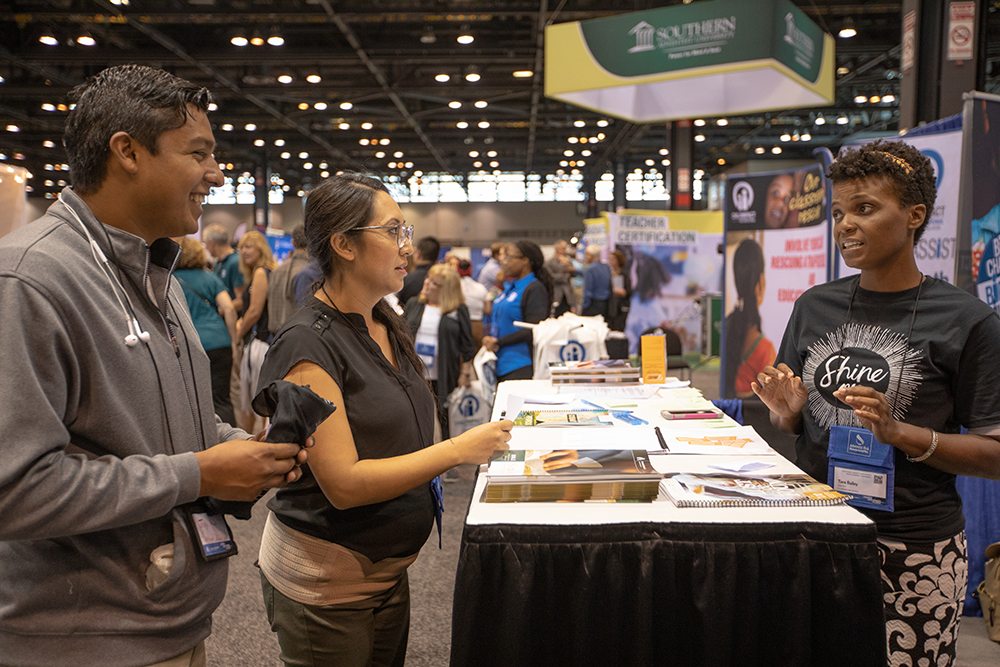
A representative of Encounter Bible Series discusses the organization’s resources with two attendees of the 2018 NAD Teachers’ Convention. Photo by Pieter Damsteegt
Engaging, friendly, wonderful, and fun were words used by exhibitors at the NAD Teachers’ Convention to describe their interactions with attendees. Throughout the four-day convention in Chicago Illinois, 6,000 participants engaged with more than 200 exhibits that featured classroom supplies, early childhood education, Adventist ministries, core curriculum services, textbooks, professional development, and online educational resources.
“Everyone comes up and gives a lot of feedback, people are very willing to talk. This has been a very friendly, interactive conference,” said Lydia Callahan, general manager of Palmetto Fortis, a marketing firm that represented several exhibitors, including the Museum of the Bible in Washington D.C. “This was our first time here and it won’t be our last.”
The same sentiment was echoed by Lana Hansen, CEO of The Learning Carpet, which is an interactive, multi-faceted tool that helps teach math, spelling, and critical thinking. “Some of the greatest teachers I’ve been so fortunate to connect with,” said Hansen “I can just tell that the people affiliated with this organization love their kids and want them to do well. I’m so pleased that I get to share with them the successes I’ve had and learn from them.”
Representatives of Adventist higher education institutions were also present from Andrews University, Burman University, La Sierra University, Loma Linda University, Southwestern Adventist University, Southern University, Oakwood University, and Walla Walla University
“This was a wonderful time to network, reconnect with alumni, meet new friends from around the world, and even [connect with] our sister institutions,” said Lewis Jones, director of planned giving and trust services for Oakwood University. “We just love kids and we want them to be saved in the end. That’s the ultimate goal.”
Innovative Approaches
The exhibit hall sparked new relationships forged on the foundation of creating dynamic experiences for students of all ages. One of the largest exhibits showcased Adventist Robotics League.
“We don’t use kids to build robots, we use robots to build kids. It’s not about the robot, it’s about the experience the kids have, and how they learn and how they grow and a new way of thinking and a new way of approaching life,” said Mel Wade, director of Adventist Robotics League. “It’s been so much fun to engage with teachers and to talk to them about the [potential impact] this can have on their students and their schools.”
Rhonda Koester created a curriculum that incorporates emotional development and dogs.
During English and language arts classes, teachers can use PAWSITIVELY Social Emotional Learning to help their students understand key skills, including empathy, self-control, regulating emotions, and resiliency during. Further, PAWSITIVELY does not require a dog to be present in the classroom, making the curriculum more attainable and less restrictive.
“They love the idea of introducing these important character-building concepts using dogs, they understand the value of doing that and how it can be engaging for kids. Not a lot of curricula have dogs involved,” said Koester, founder and CEO of PAWSITIVELY.
“I grew up in the Adventist system, went to Adventist schools all my life. So, this is really where my heart is, and this is why I wanted to be here this week because I really want to see it in the Adventist school system. We’re all about teaching love and respect and caring, but we don’t explicitly teach these skills in our curriculum, and that’s where we come into play.”
Education and Mission
The exhibits also provided a way for teachers to gain a greater understanding of programs that have been around for decades. Adventist Colleges Abroad has sent college students across the world to learn new languages and experience new cultures for 55 years, but its director, Sandra Esteves, had a specific message for high school teachers.
“I want all the academies to know that students 15 years old and older can already go abroad to Adventist schools. We have an easy system for academy students and minors,” said Esteves. The ACA director explained that seven high school students can be accompanied by one sponsor at no cost for the sponsor. “They [the seven students] can come from different academies,” said Esteves. “The students will allow the sponsor to go for free.”
Esteves says it’s important for academy and college students to go abroad because the benefits extend well beyond a new language
“We have many examples of students growing spiritually, getting baptized, growing emotionally, [and] growing intellectually,” said Esteves. “Now more than ever, we need our SDA youth to become global because we’re all about mission.”
Mission was a common theme among the Adventist schools and institutions that were present at the convention.
“It’s nice to see that we’re working for the same mission,” said Ariel Solis, faculty of Andrews University School of Architecture and Interior Design. “Our emphasis is on service. We do small projects to big projects, but we try to emphasize our church mission through our program through missionary work, and we teach students to use their profession to serve God as well.”
“The Ultimate Goal”
It would only take a few moments in the exhibit hall to feel the enthusiasm for education that transcends what can be applied in any profession or field of study.
“It’s such a positive thing for us to interact with so many teachers who are interested in teaching children about their creator - introducing them to the God who had them in his mind before they were born,” said Timothy Standish, senior scientist for the Geoscience Research Institute.
“What a beautiful thing that is. What a fabulous community to be part of. And how proud I am to be part of this Adventist church, this educational community and how encouraging it is to see that none of us are alone, we’re all working together toward this ultimate goal of introducing children to their creator and encouraging a saving relationship with them.”
